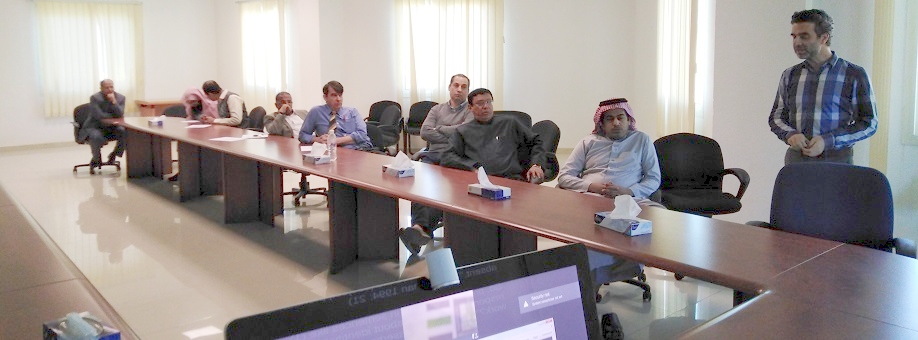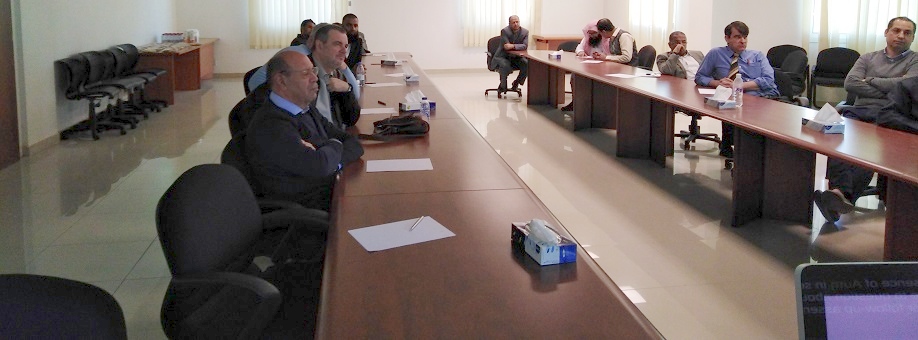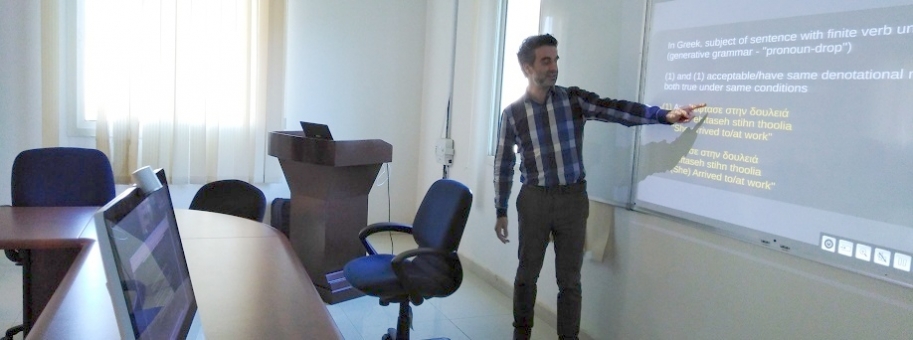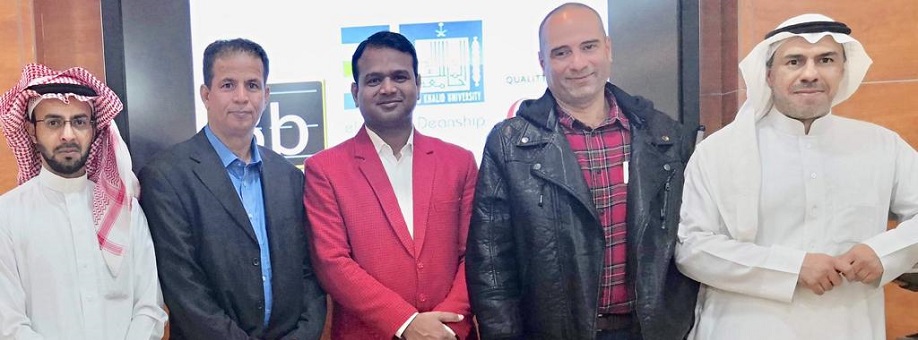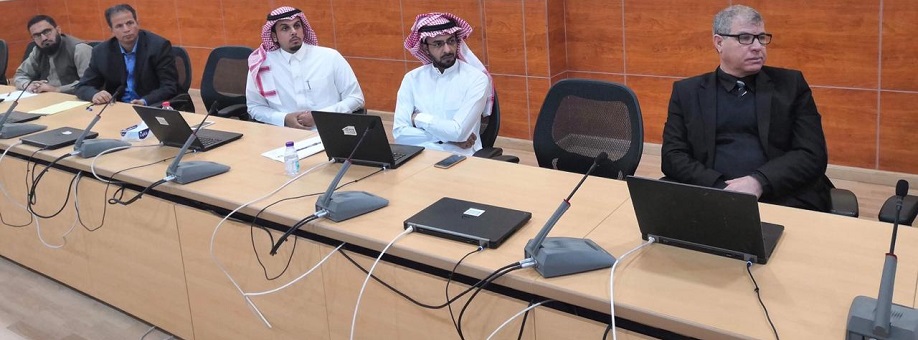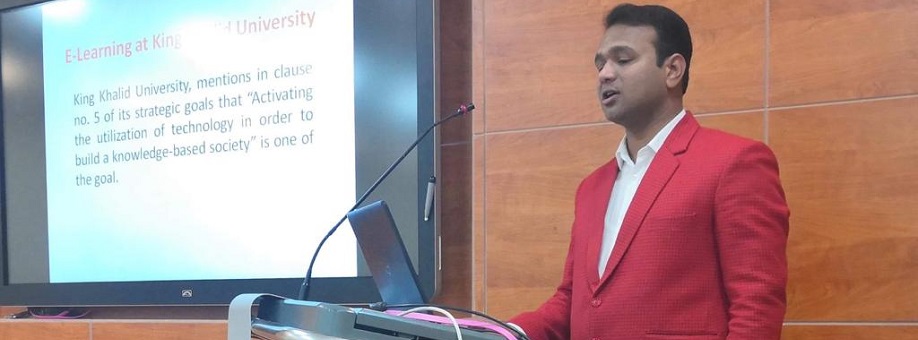The Faculty of Languages and Translation hosted training sessions to prepare our teachers to use the new textbooks effectively. On January 13th and 14th the Unlock series publisher, Cambridge University Press, conducted intensive training sessions for both male and female instructors at different locations. Dean of Faculty of Languages & Translation, Dr. Abdullah Al-Melhi, presided over and coordinated the whole program. ESL author & educator Peter Lucantoni commenced the workshop with his lively presentation. Mr. Lucantoni explained how the authors of this series reached out to teachers and learners to make sure they truly understood what they needed from a course. He reiterated that the Unlock series would motivate learners with engaging materials and visually stunning graphics in inspirational storytelling which would eventually develop their critical thinking skills in addition to language learning. Of note, Discovery Education videos are incorporated into the learning content, which is considered to be a brand new approach that equips learners with the skills and language needed for academic success.
King Khalid University Rector, Prof. Falleh R. M. Al-Solamy, Vice Rector of Academic Affairs, Saad Muhammad Du'ajim, and Vice Rector of Academic Development and Quality, Dr. Merzin Al-Shahrani, presided over the training sessions on day 2. After a brief closing ceremony, His Excellency Rector Al-Solamy wished all of the students and faculty great success with the new textbook series and course enhancement initiative. Dean Al-Melhi thanked the representatives of Cambridge University Press for their efforts and His Excellency Rector Al-Solamy and Vice Rector Du'ajim for their continued support and encouragement. 'The adoption of these new textbooks and the associated teaching techniques represent a momentous achievement for the English Language Center. We hope that it will unlock the potential of our students', said Dean Al-Melhi. He further noted that this textbook initiative was a long and difficult process. 'This project would not have come to fruition but for the dedication and persistence of my team's tireless work, and executive leadership support and encouragement of the initiative', he said.
The English Language Center at the Faculty of Languages & Translation has adopted and launched a set of new textbooks for numerous courses. These new materials are tailored to language learning for students enrolled in ENG 011, 012 and 019 English skills courses. This is an exciting development for the ELC as these new textbooks utilize cutting-edge language learning methods developed over many years. The textbooks are part of the 'Unlock' series by Cambridge University Press.
The Unlock series of books provides instruction on five essential academic language skills (reading, writing, listening, speaking and grammar). The textbooks employ a comprehensive approach to language learning in which students study all five subjects contemporaneously. This provides a near immersive exposure to the language that is of great help in achieving fluency. Moreover, the Unlock series also utilizes a 'scaffold' approach in which the materials help students progress up through a hierarchy of learning in accord with Bloom's Taxonomy. Unlock provides learners with the tools for developing the analytical and critical thinking skills necessary for mastering languages. The textbooks also stress the development of skills that will enable the students to speak and write proficiently at each level of language learning.
Unlock texts employ many different types of learning methods. The materials include many videos. These are helpful for both auditory and visual exposure to language usage. Unlock also prescribes a wide variety of both individual and group exercises designed to enhance language development. Moreover, Unlock is an effective tool for motivating students to learn. Most ordinary textbooks are dry and boring. The Unlock series focuses on study material that is engaging and sparks students' inherent curiosity. For example, the texts use interesting stories about real people and places in its lessons. Unlock is, in short, a critical component of an improved teaching strategy which will be of great benefit to our students. Adopting these new textbooks is one element of the university's goals of continuous improvement in all aspects of education.
The entire university offers its gratitude to Cambridge University Press. Textbooks are inherently expensive, especially those texts including state of the art educational materials and techniques. The university and Cambridge University Press worked very hard to provide these new textbooks at an affordable price. Ultimately, the parties found a way to sell these books to our students for 80 SR each. This is the lowest price for this series anywhere in the world. The university is so pleased to provide our students with optimal educational tools at a modest cost.
The Faculty of Languages and Translation is committed to providing the best possible language education to our students. The textbook initiative represents yet another success on the endless path of continuous improvement that helps make King Khalid University a world-class educational institution.
Date: 1/16/2019
Source: Md. Jahangir Alam
Multimedia Source: Sayed Mohammed Abdul Karim

